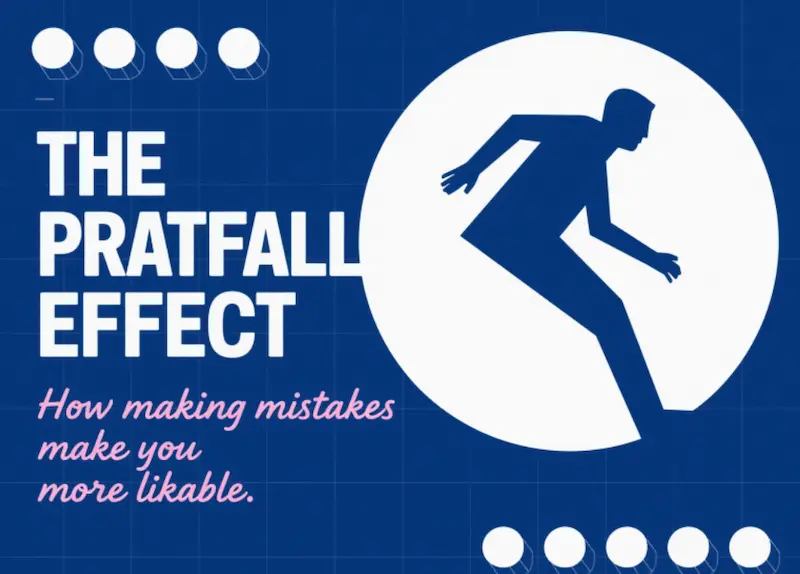The Pratfall Effect Psychology: Why Flaws Can Make You More Likable

We often assume that being flawless is the secret to being loved and respected. But psychology tells a different story. The truth is, people with small, harmless imperfections are often more likable than those who seem perfect. This fascinating principle is known as the Pratfall Effect—and it changes the way we think about relationships, leadership, and even branding.
What Is the Pratfall Effect?
The Pratfall Effect, first described by social psychologist Elliot Aronson in the 1960s, refers to the phenomenon where highly competent individuals become more attractive and relatable when they make small mistakes or reveal minor flaws.
Imagine a brilliant professor delivering a lecture. Halfway through, he spills coffee on his notes. Instead of damaging his credibility, this tiny blunder makes students warm to him—he suddenly feels more human, more approachable.
In other words: competence + vulnerability = likability.
This goes against the common belief that perfection is the key to winning admiration. Instead, it shows us that authenticity and relatability often matter more.

Why Imperfections Can Make You More Likable
Psychologists have identified several reasons why the Pratfall Effect works so powerfully in human relationships.
1. Social Comparison and Psychological Balance
We naturally compare ourselves to others. When someone is outstanding in talent or performance, it can make others feel inferior or pressured. But when that person reveals a flaw, it reduces the psychological distance.
For example, in the workplace, a high-performing colleague may feel intimidating. But if he admits he sometimes struggles with time management, it eases tension. Suddenly, others see him not as a rival but as a relatable teammate.
2. Our Craving for Authenticity
Humans crave authenticity. In friendships, dating, or professional interactions, we quickly sense when someone is too polished or fake. Flaws signal honesty.
Sharing imperfections shows trust—it signals, “I’m comfortable enough with you to be real.” This builds stronger emotional connections. In fact, studies on self-disclosure in psychology show that vulnerability often increases intimacy and trust between people.
3. Cognitive Dissonance and Balanced Perceptions
According to cognitive dissonance theory, when we see someone brilliant also making a small mistake, our brains reconcile the contradiction by creating a more well-rounded impression. Instead of idolizing or resenting them, we see them as talented and relatable. This balance fosters warmth and admiration rather than distance.
Everyday Examples of the Pratfall Effect
You’ve probably seen the Pratfall Effect in action without realizing it:
- The funny coworker: Not the top performer, but always lightens the mood with humor, even if they occasionally forget deadlines.
- The friendly neighbor: Maybe not the smartest or most stylish, but their kindness and willingness to help overshadow any clumsy moments.
- Celebrities: When a polished star trips on the red carpet but laughs it off, fans adore them even more for being “down-to-earth.”
These examples remind us that relatability often beats perfection in human connection.

How to Use the Pratfall Effect in Your Life
The Pratfall Effect isn’t about intentionally messing up—it’s about showing your humanity in ways that build trust and warmth. Here’s how you can apply it:
1. Build Affinity in Relationships
When meeting new people, share small stories about harmless mistakes. Maybe you once mixed up sugar and salt while cooking, or you accidentally wore mismatched socks to work. These anecdotes break the ice and make you approachable.
But caution: not all flaws work. Avoid revealing issues tied to ethics, responsibility, or trust—those harm credibility instead of building it.
2. Strengthen Team Dynamics
Leaders who occasionally admit challenges or past mistakes often inspire more loyalty than those who pretend to be perfect. A project manager sharing how they once struggled with communication can create a culture where employees feel safe being honest and learning from errors.
This doesn’t just reduce pressure—it fosters creativity, because people stop fearing failure.
3. Enhance Personal Branding
Even businesses can apply the Pratfall Effect. Brands that openly admit challenges often win consumer trust. For example, a sustainable fashion company might acknowledge the difficulties of reducing carbon emissions while highlighting steps they are taking. This transparency signals integrity, making customers more loyal.
4. Improve Dating and Friendships
In dating psychology, perfection often backfires. People who come across as “too good to be true” may seem distant or untrustworthy. Showing quirks—like laughing at your own clumsiness—can actually boost attraction.
Friends, too, bond through shared vulnerability. Revealing small insecurities signals emotional honesty, deepening trust.
The Fine Line: When Flaws Help vs. Hurt
The Pratfall Effect only works when flaws are minor and the person is already perceived as competent.
- Helpful flaws: Forgetting names occasionally, making silly jokes, admitting nervousness before a big presentation.
- Harmful flaws: Dishonesty, unreliability, or ethical breaches.
In short: harmless quirks build likability; serious flaws damage credibility.

Psychological Studies Behind the Pratfall Effect
Elliot Aronson’s original study had participants listen to recordings of a man answering quiz questions. The man performed well in one version but spilled coffee on himself at the end. Listeners rated him more likable than the “perfect” version.
Later research confirmed this effect across contexts—from classrooms to workplaces. It highlights how imperfection, when balanced with competence, triggers warmth rather than criticism.
According to research published in Journal of Personality and Social Psychology, audiences consistently rated competent individuals with minor flaws as more attractive than flawless ones, reinforcing that relatability is a social strength.
Why This Matters in a “Perfection-Obsessed” World
In American culture, where social media highlights curated, “perfect” lives, the Pratfall Effect offers a refreshing truth: authenticity is magnetic.
By showing humanity, we reduce the walls between ourselves and others. We don’t need to hide every imperfection—in fact, those quirks may be the very thing that makes us memorable and loved.
The Pratfall Effect psychology teaches us a powerful lesson: flaws can be strengths when paired with competence and authenticity. Whether in friendships, dating, work, or branding, showing our real selves makes us more approachable, trustworthy, and likable.
In a world obsessed with perfection, maybe the most attractive thing you can be is—real.
If you found this article insightful, share it with a friend who could use a reminder that being “perfect” isn’t necessary.






